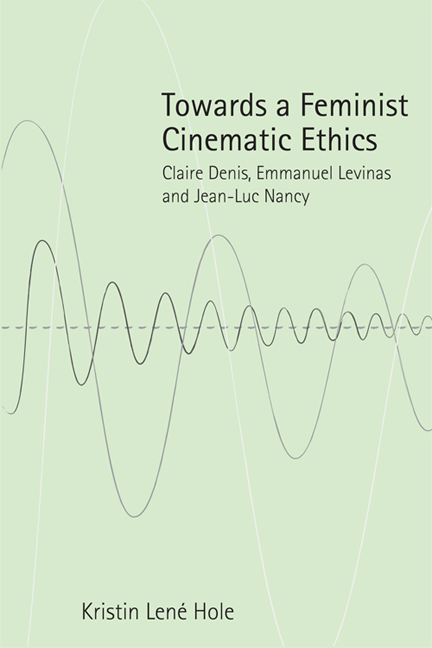Book contents
- Frontmatter
- Contents
- List of Figures
- Acknowledgements
- 1 Encounters, Intrusions: Denis, Levinas, Nancy
- 2 Film Interrupted: Denis, Nancy and an Ethics of Sense
- 3 Otherwise than Hollywood: Denis, Levinas and an Aesthetic of Alterity
- 4 Troubling the Body: Trouble Every Day, Dance and the Non-Mythic Body
- Coda
- Bibliography
- Index
4 - Troubling the Body: Trouble Every Day, Dance and the Non-Mythic Body
- Frontmatter
- Contents
- List of Figures
- Acknowledgements
- 1 Encounters, Intrusions: Denis, Levinas, Nancy
- 2 Film Interrupted: Denis, Nancy and an Ethics of Sense
- 3 Otherwise than Hollywood: Denis, Levinas and an Aesthetic of Alterity
- 4 Troubling the Body: Trouble Every Day, Dance and the Non-Mythic Body
- Coda
- Bibliography
- Index
Summary
The previous chapters have worked towards developing a cinematic ethics of sense and aesthetic of alterity, through Nancy and Levinas respectively. In this chapter, I focus on the body as it relates to the ethical and argue that Denis, Nancy and Levinas make important contributions to rethinking the body in terms that challenge dominant Western narratives. I also examine the ways in which Denis's films reveal the notion of an autonomous bodily identity to be a Western construction that has relied on the colonisation or dehumanisation of certain bodies to maintain its privileged status.
To do this I choose a difficult film: Trouble Every Day is a sophisticated engagement with the horror genre that addresses themes of bodily violence, vulnerability and non-immunity. Yet, because of its difficulty, the film is worth a sustained look. I have argued that Denis's cinema reveals the insufficiency of dominant film language when it comes to fostering ethical modes of encounter. Here I turn specifically to genre, to examine how Trouble Every Day probes the limitations of generic modes in cultivating new practices of looking. Genre films tend to rely on conventions for making meaning that often foreclose the kinds of open ethical encounters that I have foregrounded throughout this project. By touching on but also moving away from the dominant tropes and formal and narrative conventions of the horror film, Trouble asks us to look differently, while drawing attention to our customary patterns of viewing. The film deals with a disease that compels those afflicted to deface and dismember their sexual partners. Rather than condoning or refusing to moralise regarding sexual violence, I read the film as highlighting a condition of bodily vulnerability that the Western subject has historically disavowed. In Trouble, Denis highlights our current moment as one of crisis for the Western subject ndash; perhaps one that she is especially attuned to given her own biography. This film in particular presents a challenge to the myth of the self-contained monadic modern body and therefore asks us to start from a place where we recognise our shared dependency.
- Type
- Chapter
- Information
- Towards a Feminist Cinematic EthicsClaire Denis, Emmanuel Levinas and Jean-Luc Nancy, pp. 117 - 158Publisher: Edinburgh University PressPrint publication year: 2015



